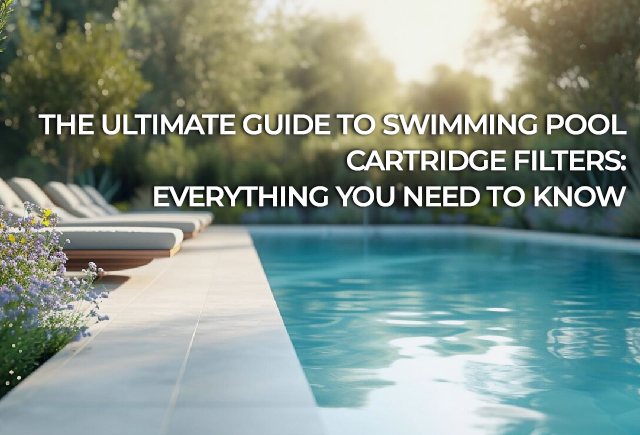
Swimming pools are a wonderful addition to any home, providing a fun and refreshing way to relax. However, keeping pool water clean and safe requires proper filtration. One of the most popular filtration systems today is the cartridge filter. Whether you're a seasoned pool owner or new to pool maintenance, this guide will give you a comprehensive understanding of swimming pool cartridge filters, including how they work, their benefits and why they are a superior option for many pool owners.
Cartridge filters are one of the three main types of pool filtration systems, alongside sand filters and diatomaceous earth (DE) filters. These filters use a cylindrical element made of pleated polyester or other synthetic material to trap dirt, debris and contaminants from the water. The cartridge is housed inside a filter tank, and as water flows through the cartridge, particles are trapped, allowing clean water to be returned to the pool.
The functioning of a cartridge filter is relatively simple yet highly effective.
Here’s how the process works:
Cartridge filters don’t use sand or DE powder, making them low-maintenance and environmentally friendly. This simplicity is a key reason why many pool owners prefer them over other filtration systems.
Cartridge filters play a critical role in maintaining the water quality in your swimming pool.
Here's why they are indispensable:
Compared to other types of pool filters, cartridge filters offer a range of benefits that make them an excellent choice for residential pools:
Cartridge filters can filter out particles as small as 10-15 microns (a human hair is about 70 microns thick). This is finer than sand filters, which typically filter particles down to 20-40 microns. The ability to filter out smaller particles means cleaner, clearer water.
Since cartridge filters have a larger surface area, they allow for more water flow with less pressure. This reduces the workload on your pool pump, saving energy and lowering your utility bills.
Maintaining a cartridge filter is much easier compared to sand and DE filters. Cartridge filters don’t require backwashing, which is a water-wasting process used in other filter types. Instead, the cartridge needs to be removed, cleaned and reinserted when dirty.
Unlike sand filters, cartridge filters don’t require backwashing, which can waste hundreds of gallons of water each time. Instead, they can be cleaned and reused multiple times, reducing water waste and chemical loss.
Cartridge filters are often more compact than sand or DE filters, making them an ideal option for pool owners with limited space. They can fit in tighter areas without sacrificing filtration quality.
When selecting a cartridge filter for your pool, there are a few key factors to consider:
Larger pools require more robust filtration systems to keep the water clean. Ensure the cartridge filter you select is rated for the volume of water in your pool. Pool cartridge filters are rated based on gallons per minute (GPM) and pool size, so choose one that can handle your pool’s capacity.
Check the flow rate of your pool pump and make sure the cartridge filter can handle the water flow. The pump’s GPM should not exceed the filter’s capacity to avoid damaging the cartridge.
The surface area of the filter cartridge, which is determined by the pleats, affects how well the filter can capture debris. The more pleats, the more surface area the filter has, which can help it last longer and require less frequent cleaning.
Choosing a high-quality brand with a reliable reputation ensures you get a durable and efficient filter. Opt for trusted pool equipment brands that provide a good warranty and support.
Proper maintenance is crucial to prolonging the life of your cartridge filter and ensuring your pool stays clean.
Here are a few tips to keep your filter in peak condition:
A cartridge filter is one of the most efficient and convenient options for keeping your swimming pool clean and safe. Its ability to filter out fine particles, energy efficiency and ease of maintenance make it an excellent choice for most pool owners. By understanding how cartridge filters work and the benefits they offer, you’ll be well-equipped to maintain crystal-clear water all season long.
If you’re looking to install a new pool filtration system or upgrade your current one, consider investing in a cartridge filter to enjoy clear, sparkling pool water with less hassle.
2023-2025 Medley All Rights Reserved